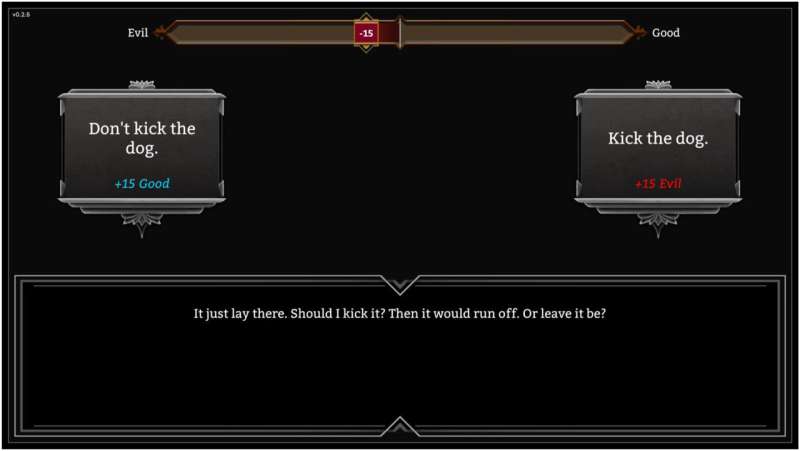
Researchers have built their own computer game to test the impact of meters which show players the morality of their decisions.
Two papers published by Macquarie University researchers reveals that most of us ignore the meter when a moral choice is clear, but we use it when the choice is more morally ambiguous. And some of us, about ten percent, will do anything to win.
You are playing The Great Fire, a narrative computer game. It’s all about Frankie, an usher in a cinema in regional Australia in the 1940s, who is confronted by a murderous psychopath.
Along the way, players have to make choices which affect the progress and outcome of the game. Some are simple black and white decisions, such as kicking a dog or not, but others are what are called “trolley problems”, whether you will kill or harm someone if it saves others, for instance.
Each choice is labeled with a score of good or evil, and your total morality registers on a meter at the top of the screen throughout the game. But the moral impact of a choice is not always clear, if you go by its score. It can even be counterintuitive. Do you rob a homeless person of money that could assist you? What happens if the moral score insists this is a good thing?
“Our hypothesis was that under that circumstance, players might choose to steal,” says Dr. Malcolm Ryan, course director of the Games Design and Development Program in School of Computing at Macquarie University. “But we were relieved to find telling people that stealing money is good doesn’t change their response… Although there will always be about 10 percent who will choose to do it anyway.”
The great game
To study such issues is exactly why he and his long-term co-researcher Professor Paul Formosa, co-director of the Centre for Agency Values and Ethics in the Department of Philosophy developed The Great Fire. They were assisted by colleagues such as writer Dr. Jane Messer and cognitive psychologist Dr. Stephanie Howarth to build a fully functional computer game of which they own the course code, allowing them to change things at will.
“Morality meters, that indicate how good or evil your avatar is, have been around computer games since 1985 when Richard Garriott pioneered the idea in Ultima IV.” Dr. Ryan says. But until now there has been no empirical data on which to base discussion of their impact on the attractiveness of games, or their effect on players.
Entertainment and education
Dr. Ryan sees this work as important for several reasons. “For me, the entertainment value of games is primary. I want to improve them as a designer, not just because they are fun, but because I want to see them become like more mature works of art and literature, able to deal with serious topics of morality.”
This has application to moral education and awareness, he says. “Games provide a way of simulating different moral scenarios and asking what is the right thing to do.”
The research involving The Great Fire has already generated two papers. The first, published in the journal Games and Culture in January last year, was qualitative, exploring the feelings of players and their responses to the morality meter. It showed a difference between players who made choices simply to maximize their morality score, and others who viewed the meter as some sort of moral guide.
A second paper published in the Computers in Human Behaviour provides the first quantitative data on morality meters. The results show that the meter is generally ignored when a moral choice is straightforward, but it can influence decisions when the choice is more morally ambiguous.
Further work
The team has already started on further work, such as a study on the impact, in morally ambiguous situations, of knowing what others think. If we know how a majority will act, do we tend to go along with the crowd?
In addition, the Department of Computing is currently fitting out a Games User Research Lab where biometric measures, such as skin conductance and eye blink rate can be taken, while experimental subjects are engrossed in computer games. “Blink rate, for instance, can be an indicator of how deeply you are thinking about something,” says Malcolm Ryan. “These biometrics will give us a snapshot of the moment-by-moment experience of players.”
“There is a lot of interest worldwide in this area,” he says, “so I will be running a workshop at the Digital Games Research Association conference in June in Seville, Spain.” The session will also be available online. And the researchers are already talking with a local games company which is developing a game based around ethical decisions.
More information:
Malcolm Ryan et al, The effect of morality meters on ethical decision making in video games: A quantitative study, Computers in Human Behavior (2022). DOI: 10.1016/j.chb.2022.107623
Paul Formosa et al, Morality Meters and Their Impacts on Moral Choices in Videogames: A Qualitative Study, Games and Culture (2021). DOI: 10.1177/15554120211017040
Citation:
How good or evil are you when gaming? (2023, May 31)
retrieved 31 May 2023
from https://techxplore.com/news/2023-05-good-evil-gaming.html
This document is subject to copyright. Apart from any fair dealing for the purpose of private study or research, no
part may be reproduced without the written permission. The content is provided for information purposes only.
For all the latest Technology News Click Here
For the latest news and updates, follow us on Google News.

